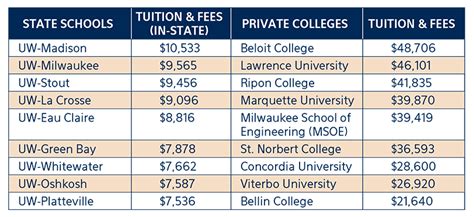As you embark on your academic journey at Weber State University, it’s crucial to have a clear understanding of the financial implications involved. This comprehensive guide will provide you with detailed information on tuition costs, fees, and other essential expenses associated with attending Weber State.

Tuition Costs
Tuition costs at Weber State University vary depending on a number of factors, including the level of study, residency status, and program of choice. Here’s a breakdown of the tuition rates for different categories of students:
Undergraduate Tuition (per credit hour)
| Residency Status | In-State | Out-of-State |
|---|---|---|
| Full-time (more than 12 credit hours) | $248 | $954 |
| Part-time (less than 12 credit hours) | $263 | $1011 |
Graduate Tuition (per credit hour)
| Residency Status | In-State | Out-of-State |
|---|---|---|
| Master’s Programs | $376 | $932 |
| Doctoral Programs | $491 | $987 |
Fees
In addition to tuition, students at Weber State are required to pay a variety of fees to cover administrative and academic services. These fees typically include:
- Student Fees: $120.50 per academic year
- Technology Fee: $131.75 per academic year
- Activity Fee: $115 per academic year
- Campus Recreation Fee: $119 per academic year
- Health Fee: $30 per academic year
- Distance Learning Fee: $30 per credit hour
- International Student Fee: $200 per academic year (for non-immigrant students)
Other Expenses
Beyond tuition and fees, students should also budget for additional expenses such as:
- Books and Supplies: $1,000 – $2,000 per academic year
- Housing: $6,000 – $10,000 per academic year (on-campus housing)
- Food: $3,000 – $5,000 per academic year
- Transportation: $1,000 – $3,000 per academic year
- Personal Expenses: $1,000 – $3,000 per academic year
Financial Aid
Weber State University offers a wide range of financial aid options to help students cover their education costs. These options include:
- Scholarships: $18 million awarded annually in scholarships
- Grants: $30 million awarded annually in grants
- Work-Study: Federal funding for part-time employment on campus
- Loans: Federal and private student loans available
Tips for Saving Money
To minimize your expenses while attending Weber State University, consider the following tips:
- Apply for Financial Aid: Explore all available financial aid opportunities, including scholarships, grants, and loans.
- Consider Part-Time Enrollment: If full-time study is not feasible, consider taking courses part-time to reduce your tuition costs.
- Take Advantage of Campus Resources: Utilize free resources such as the campus library, tutoring services, and career counseling.
- Live Off-Campus: Off-campus housing options can be more affordable than on-campus housing.
- Cook Your Meals: Preparing meals at home can save significant amounts of money compared to eating out.
- Use Public Transportation: Take advantage of public transportation options to save on transportation costs.
Conclusion
Understanding the costs associated with attending Weber State University is essential for planning your finances effectively. By exploring the information provided in this guide and utilizing the tips for saving money, you can minimize your financial burden and focus on your academic success. Remember to contact the Weber State University Financial Aid office or visit their website for more detailed information and personalized financial assistance.
